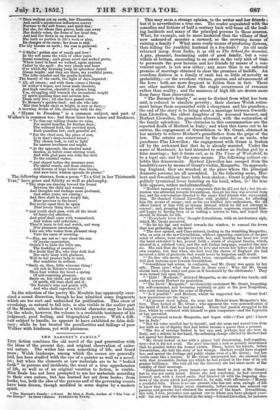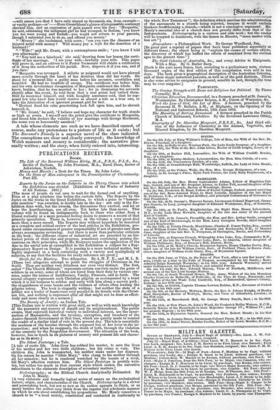THE BA.BONET'S FAMILY. *
Tam fiction combines the old novel of the past generation with the ideas of the present day, and original observation of exter- nal nature. The writer has seen something of life, and heard more; Welsh landscape, among which the scenes are generally laid, has been studied with the eye of a painter as well as a novel- mat; but when the elements or raw materials are to be "bodied forth" in persons and incidents, the want of a true apprehension of life, as well as of an original vocation to fiction, is visible. Miss Beale has not been prompted to use her materials according to their own nature, but has learned her art from books; from books, too, both the idea of the persons and of the governing events have been drawn, though modified in some degree by a modern Spirit.
• The Baronet's Family; a Novel. By Miss A. Beale, Author of "The Vale of the Towey." in three volumes. Published by Newby.
This may seem a strange opinion, to the writer and her friends ; but it is nevertheless a true one. The reader acquainted with the comedies and fictions of half a century back will-trace all the lead- ing incidents and many of the principal persons to those sources. What, for example, can be more hacknied than the villany of that now unheard-of monster a steward, as the crowning means of ruining a family P What more ready means of producing distress, than killing the youthful husband in a fox-hunt ? An old uncle returned meg. from India is as old as The School for Scandal. A gay, pleasant, fascinating cadet of good family, but a very villain at bottom, succeeding to an estate in the very nick of time to persecute the poor heroine and her friends by means of a con- venient agent, is not new either • any more than is an enforced promise of marriage obtained to dear the premises of bailiffs. An overdone distress in a family of rank has as little of novelty as Btobability,—or the overdone virtues, genius, and advancement of the hero : both are more frequent in fiction than in fact. There are other matters that form the staple occurrences of romance rather than reality; and the manners of high life are drawn more from fancy than observation.
"The Baronet's family," as may be divined from what has been said, is reduced to absolute poverty; their obscure Welsh retire- ment brings them acquainted with a clergyman and his grandson; the end of the story is to bring about a marriage between Gwenth- lean Llewellen' the eldest daughter of the deceased baronet, and Herbert Llewellen, the grandson aforesaid, with the restoration of the family splendour. The obstacles to this consummation are the reported death 4 Herberfin Italy ; tuid when this turns out to be untrue, the engagement of Gwenthlean to Mr. Grant, obtained in her anxiety to relieve Herbert's grandfather from the gripe of the law. The estates are recovered by the return of an uncle who purchases Plas Llewellen ; the engagement with Grant is broken off by the awkward fact that he is already married. Under the name of Mordaunt, he had intended to seduce an Italian girl by a false mairiage ; but it turns out, as in. The Vicar of Wakefield, to be a legal one, and by the same means. The following extract ex- hibits this denouement Herbert Llewellen has escaped from the banditti's cave by means of Grant's victim, Margarita. On approach- ing England, they are wrecked at the place where the principal dramatis personte are all assembled. In the following scene, Her- bert and Gwenthlean have both been shaken; Grant is playing the politely tyrannical lover insisting on his bond, when, lo! the true wife appears, rather melodramatie.ally.- "Herbert managed to retain a composure that he did not feel ; but his at- tention was attracted towards Gwenthlean, though his face was averted from her, and his conversation directed to the many kind friends who surrounded hill He thanked Colonel Llewellen with grateful fervour, for affording him the means of escape ; and as his eye kindled into enthusiasm, the old officer looked at him with an intense interest which he did not attempt to conceal ; and, grasping his hand with affectionate eagerness, expressed him- self happy in having been of so trifling a service to him, and hoped they should be friends for life.
"'Everybody loves him,' thought Gwenthlean, with an involuntary sigh, which Mr. Grant perceived.
"He bit his lips and walked towards the window, to conceal the frown that was gathering on his brow.
"The door opened, and Clare entered, leading in the trembling Margarita ; who, as soon as she saw Gwenthlean, without appearing conscious of the pre- sence of others, went straight towards her, and, bending her head low over the hand extended to her, poured forth a strain of eloquent thanks, which, uttered in a subdued voice, and the soft Italian language, sounded like mu- sic. She said that she had learned to love and revere her before she left her own country, but that when she first trod the shores of England she had incurred a debt of gratitude that would never be forgotten until death. "'No fino alla mort,e,' she added, twice, energetically, as she raised her full dark lustrous eyes towards Gwenthlean. "Gwenthlean had arisen, in confusion, and Mr. Grant was again in by her
These ose eyes ! what was there those eyes ? Why did Mr. shrink back—then stand and gaze as if fascinated by the rattlesnake ? They were turned full upon him.
" Iddid ! Mordante !' shrieked Margarita, as she clasped her hands, and rushed towards Herbert for protection. "The Devil ! Margarita! involuntarily exclaimed Mr. Grant forgetting his self-command, and becoming suddenly as pale as the poor Neapolitan, who sunk fainting into the arms of Herbert. " 'Is it possible ? ' said Herbert, whilst he supported her. 'Great God! how mysterious are thy ways.' " All_present stood aghast, for none but Herbert knew Margarita's his- tory. They looked at Mr. Grant ; who appeared the very personification of the Spirit of Evil that he had invoked. Every bad passion struggled in his face' whilst he combated with himself to gain composure—and the hypocrite at last prevailed.
"He advanced towards Margarita, and began with—'Poor girl! I knew her in Italy.' "But his voice recalled her to herself; and she arose and waved him from her with an air of dignity that had better become a queen than a peasant., "The The fire of revenge flashed in her eye, and, perhaps, had she been in Italy, and a stiletto in her hand, the softening change effected by Herbert had not spared her destroyer.
"Mr. Grant looked at her with a glance half threatening, half supplica- tory—but it did not avail. She gave him back a look so proudly determined that he quailed before his former victim. There, before his friends, before Gwenthlean she told the story of her wrongs. Herbert would have stopped her, and spared the feelings and public shame even of a Mr. Grant ; but her words came like a torrent. If Mr. Grant interrupted her' she silenced bun with that irresistible Italian eye which he had praised in the time of its yet greater brilliancy. She told all but the discovery she had since made of the validity of their marriage. "Indignation was in every breast—no one dared to look at Mr. Grant : but he was not easily foiled. Before she had concluded, he had recovered himself, and, with a forced smile, that blended ill with the lingering sha- dows of the storm which had preceded it, he said, with effrontery—' Merely a youthful folly. There is no one present who has not seen enough of life to know that these things occur constantly, before reason has sobered our passions and genuine love obtained the mastery of the heart. Gwenthlean., this will, I fear, prejudice you against one to whom you have pledged your- self : but any man who has lived in the army—Colonel Llewellen, for instance -7-will assure you that I have only sinned as thousands sin, from example— or vanity perhaps—or'—Here Gwenthlean's glance of irrepressible contempt checked him and an expression of pain passed over his face : 'Margarita,' he said, addressing the indignant girl he had wronged, in Italian, you know you too were young and foolish—you would not return to your parents, though I entreated you to do so, and offered you money.' " 'Money ! ' she exclaimed, with scorn ; ' can you cure the diseases of an injured mind with money ? 'Will money pay a, wife for the desertion of a husband?'
" Wife ! ' said Mr. Grant, with a contemptuous smile; you know I told you afterwards.'
"'You told me a falsehood,' she said drawing from her bosom the certi- ficate of her marriage. 'I am your wife—lawfully your wife. This paper will prove it, and an address to il Pastor Vermorate will obtain a ratification of it from the authorities of his parish. Now, disprove it if you can, and if you dare.' "Margarita was revenged. A stiletto or poignard would not have pierced more cruelly through the heart of her deceiver than did her words. He stood for a moment like a guilty man before his accusers, crestfallen awl humbled. He had no loophole of escape. The certificate was before him, and his own involuntary recognition of Margarita confirmed the whole. He knew, besides, that he was married to her ; for in dismissing his servants shortly, after the event, he told them that a real priest had united them. Still he recovered himself, and with haughty assurance said, that he sup- posed few who knew him would receive so absurd a tale as a true one, or take the fabrication of an ignorant peasant girl for fact.
"Herbert fixed his calm penetrating look full upon him, and he shrunk beneath it.
"'Mr. Grant,' he said, 'I believe and hope my character for truth stands as high as yours. I myself saw the priest give the certificate to Margarita, and heard him declare the validity of her marriage with George Mordaunt, the name you so honourably assumed.'"
A tale whose elements are such as we have described cannot, of course, make any pretensions to apicture of life as it exists; but The Baronet's Family is a superior novel of the class indicated. The conceptions are clear and clearly conveyed; the knowledge of Welsh manners and scenery is considerable; the narrative plea- santly written; and the story, when fairly entered into, interesting.



























 Previous page
Previous page